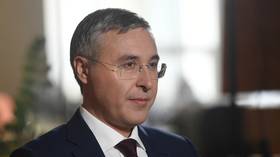Six months on, Russia overturns controversial ban on its scientists cooperating with foreigners

When the measure was introduced last year, it was slammed as a return to Soviet-style paranoia. On Monday, Russia's new government lifted most restrictions on contacts between Russian scientists and foreigners.
Valery Falkov, who replaced Mikhail Kotyukov as science and higher education minister in January, announced the policy reversal, adding that Russia is "interested in developing cooperation on the principles of open science."
Falkov added that he wants "Russia and Russian scientists [to] participate in all the largest [international] scientific projects."
Also on rt.com Strings attached: Why US can’t stop using ‘toxic’ Russian RD-180 rocket enginesHowever, the minister said constraints will remain in certain branches of science where the relevant project is considered important to national security. Falkin emphasized that this is standard practice worldwide.
The previous rules, introduced last August, forced scientists to report any communication with foreign colleagues to their superiors. They also limited the scope of contacts with international peers.
The head of a scientific organization had to notify the ministry five days before any meeting with foreign colleagues, listing all Russian participants. After the event, they were then obliged to file a report on what was discussed.
The Russian Academy of Sciences (RAS) felt it undermined Russia's national interests and had asked politicians to rescind the rule. Vice-President of the RAS Alexei Khokhlov said it should only apply to specialists working with state secrets.
Like this story? Share it with a friend!














